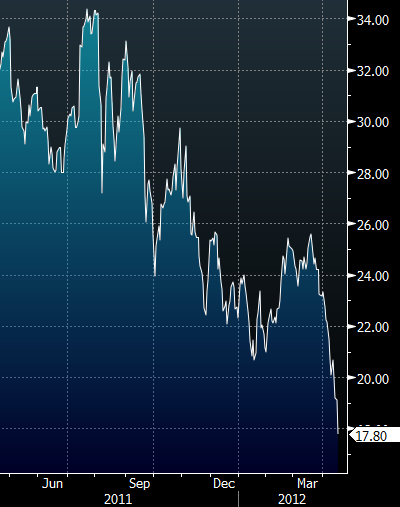Time For The SEC To Institute New Disclosure Rules On CEO Leverage
Sober Look | Apr 19, 2012 03:24AM ET
Here is a challenge for the SEC. Instead of Reuters : Aubrey McClendon, the CEO of Chesapeake Energy Corp, has borrowed as much as $1.1 billion over the last three years against his stake in thousands of company wells - a move that analysts, academics and attorneys who reviewed loan documents say raises the potential for conflicts of interest.
The loans, which haven't been previously detailed to shareholders, are used to fund McClendon's operating costs for an unusual corporate perk that offers him a chance to invest in a 2.5 percent interest in every well the company drills. McClendon in turn is using the 2.5 percent stakes as collateral on those same loans, documents filed in five states show.
The size and nature of the loans raise questions about whether McClendon's personal financial deals could compromise his fiduciary duty to Chesapeake investors, experts who reviewed the documents told Reuters.
Both McClendon and Chesapeake said the loans don't pose any conflict of interest. And they are private transactions that the company has no responsibility to disclose or to vet, Chesapeake said. "There are no covenants or obligations in my loan documents or mortgages that bind Chesapeake in any way," McClendon wrote in an email to Reuters.
Sure there are no covenants and there doesn't seem to be anything illegal about the loans. But this is highly relevant for the shareholders - probably more relevant than many other disclosures CHK makes. Again, the SEC needs to focus on broad investor protections and disclosures, rather than concentrating so much on hedge funds, whose investors represent a tiny fraction of the population. Some of the largest mutual funds such as Vanguard and State Street are the biggest shareholders of CHK. That means that most people's 401Ks probably have exposure.

Trading in financial instruments and/or cryptocurrencies involves high risks including the risk of losing some, or all, of your investment amount, and may not be suitable for all investors. Prices of cryptocurrencies are extremely volatile and may be affected by external factors such as financial, regulatory or political events. Trading on margin increases the financial risks.
Before deciding to trade in financial instrument or cryptocurrencies you should be fully informed of the risks and costs associated with trading the financial markets, carefully consider your investment objectives, level of experience, and risk appetite, and seek professional advice where needed.
Fusion Media would like to remind you that the data contained in this website is not necessarily real-time nor accurate. The data and prices on the website are not necessarily provided by any market or exchange, but may be provided by market makers, and so prices may not be accurate and may differ from the actual price at any given market, meaning prices are indicative and not appropriate for trading purposes. Fusion Media and any provider of the data contained in this website will not accept liability for any loss or damage as a result of your trading, or your reliance on the information contained within this website.
It is prohibited to use, store, reproduce, display, modify, transmit or distribute the data contained in this website without the explicit prior written permission of Fusion Media and/or the data provider. All intellectual property rights are reserved by the providers and/or the exchange providing the data contained in this website.
Fusion Media may be compensated by the advertisers that appear on the website, based on your interaction with the advertisements or advertisers.